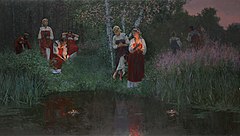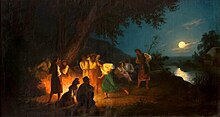| Kupala Night | |
|---|---|
 Ivan Kupala. Fortunetelling on the wreaths, by Simon Kozhin, 2009 | |
| Also called | Kupala's Night, Kupala |
| Observed by | Slavs |
| Significance | celebration relates to the summer solstice |
| Date |
|
| Frequency | Annual |
| Related to | Summer Solstice, Saint John's Eve, Nativity of St. John the Baptist |
Kupala Night (also Kupala's Night or just Kupala; Polish: Noc Kupały, Belarusian: Kupalle, Russian: Ivan Kupala, Kupala, Ukrainian: Ivan Kupalo) is one of the major folk holidays[1] in some of the Slavic countries[2] that coincides with the Christian feast of the Nativity of St. John the Baptist[1] and the East Slavic feast of Saint John's Eve. In folk tradition, it was revered as the day of the summer solstice[1][2] and was originally celebrated on the shortest night of the year, which is on 21-22[3][4] or 23-24[2] of June {Czech Republic, Poland, Slovakia, Bulgaria (where it is called Enyovden), and Ukraine (since 2023),[5] and according to Julian calendar on the night between 6 and 7 July (Belarus, and Russia). The name of the holiday is ultimately derived from the East Slavic word kǫpati "to bathe".
A number of activities and rituals are associated with Kupala Night, such as gathering herbs and flowers and decorating people, animals, and houses with them; entering water, bathing, or dousing with water and sending garlands on water; lighting fires, dancing, singing, and jumping over fire; and hunting witches and scaring them away. It was also believed that on this day the sun plays and other wonders of nature happen.[1] The celebrations are held near the water, on the hills, surrounding that[clarification needed]; chiefly, young men and women participate in these folkloric traditions.[2] The rituals and symbolism of the holiday may point to its pre-Christian origins.

- ^ a b c d Vinogradova & Tolstaya 1999, p. 363.
- ^ a b c d Holobuts’ky & Karadobri 2009, p. 499.
- ^ Aleksander Gieysztor: Mitologia Słowian. Warszawa: Wydawnictwa Uniwersytetu Warszawskiego, 2006. ISBN 978-83-235-0234-0, s. 244
- ^ Native Polish Church https://rkp.org.pl/swieta
- ^ https://apostrophe.ua/ua/news/society/2023-06-08/novyiy-kalendar-ptsu-kogda-v-2023-godu-budem-otmechat-ivana-kupala-i-drugie-letnie-prazdniki/298591. Новий календар ПЦУ: коли в 2023 році відзначатимем Івана Купала та інші "літні" свята